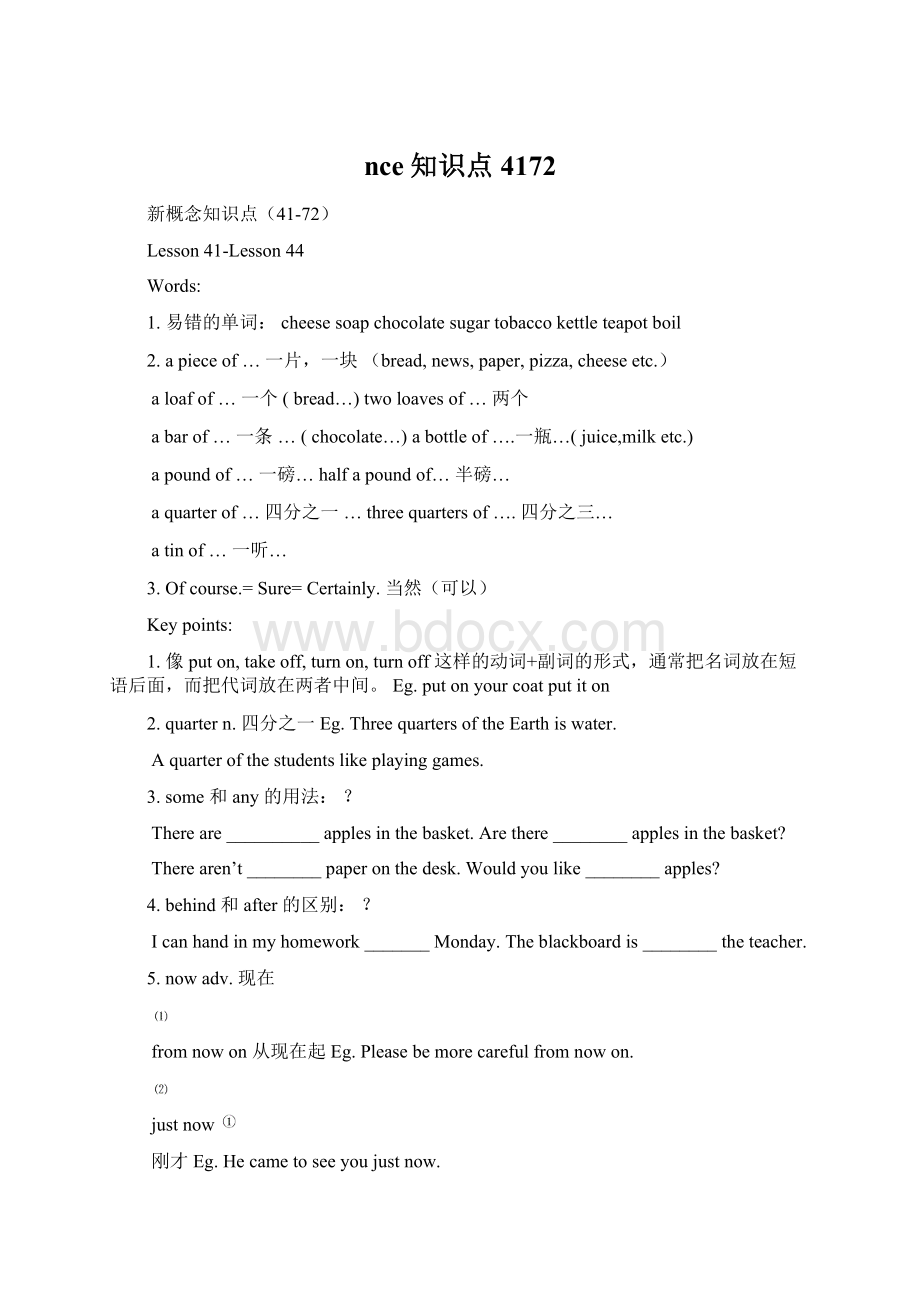nce知识点4172Word格式.docx
《nce知识点4172Word格式.docx》由会员分享,可在线阅读,更多相关《nce知识点4172Word格式.docx(19页珍藏版)》请在冰豆网上搜索。

justnow
刚才Eg.Hecametoseeyoujustnow.
现在Eg.Heisbusyjustnow.
6.find和lookfor的区别:
I_________mypeneverywhere,andfinally________itonthefloor.
7.find和findout的区别:
Jenny________awalletlyingontheground.
Thepolice________themanwhostole(偷)thebike.
8.boilingwater开着的水boiledwater开水boilingpoint沸点
Lesson45-Lesson48
bossminutehandwritingterribleliftbiscuitfreshbutterpurehoneyripejamsweetchoicewinebeer
2.固定词组:
flyovergoacrossjumpoff
3.boss----bosses
1.canmodelverb.cannot=can’t过去式couldcouldn’t
can+v.举例?
2.minuten.分(钟)
waitaminute等一会Eg.Pleasewaitaminute,thedoctoriscoming!
inaminute一会儿,立刻Eg.I’mcomingbackinaminute.
3.askv.
询问:
asksb.sth.Eg.MayIaskyouaquestion?
要求,请求asksb.todosth.Eg.Mymotheraskedmetowashmysocks.
4.terribleadj.
可怕的aterribleman
糟糕的Thatmusicisterrible.
5.nextadj.
隔壁的theroomnextdoor隔壁的房间
下一个There’sgoingtobeasportsmeetingnextweek.
6.What’sthematter?
=What’swrong?
=What’stheproblem?
=Isthereanythingwrong?
7.lift
v.举起,提起Eg.Theoldmancan’tliftthebox.
n.电梯Eg.Hetakesthelifttothefifthfloor.
Heusesalifttogoupanddown.
8.cake表示指以切开的蛋糕时,是不可数名词;
表示与大小无关的各个蛋糕时是可数名词
有时候用apieceofcake表示容易做的事情It’sapieceofcake.这是件小事情
9.Ican________butIcan’t_______________
10.likev.喜欢,想要<
反〉dislike<
近>
love,enjoy
like,love,enjoy的区别
like对某人某事的赞许或发生兴趣
liketodosth.表示此时此刻想做的一次性动作;
likedoingsth.表示平时的喜欢喜爱
Eg.Doyouliketoplaychess?
Ilikesingingsongs/
love表示对人或事物有深挚的感情,爱慕Eg.Weloveourcountry.
enjoy表示欣赏,享受enjoydoingsth.Eg.Heenjoysreadingbooks.
Howdoyoulike____________?
你觉得…怎么样?
Eg.Hodoyoulikethisfilm?
like…best=favourite最喜欢
likeAbetterthanB=preferAtoB对于B来说更喜欢A
Eg.Ilikeautumnbetterthanspring.=Ipreferautumntospring.
11.likeprep.像…
belike像…Eg.Sheislikehermotherverymuch.
looklike看起来像…
12.wantv.想
wanttodosth.=wouldliketodosth.想要做某事
wantsb.todosth.想让某人做某事Eg.Iwantyoutopicktheapplesonthetree.
13.Doyoulike___________?
Doyouwant_______________?
Lesson49-Lesson52
butcherbeeflambhusbandsteakmincetrutheithertomatopotatocabbagelettucebeanpeachclimatecountrypleasantweatherspring
WarmsometimessummerautumnwinterJanuaryFebruaryMarchAprilMay
JuneJulyAugustSeptemberOctoberNovemberDecember
atthebutcher’stotellyouthetruth
1.meat表示肉的总称包括beefporkmuttonchickenlamb不包括fish
2.chicken
[C]鸡Eg.Ayoungchickeniscalledachick.小鸡被叫做鸡雏
[U]鸡肉Eg.Theyhavechickenforlunch.
3.tellv.告诉told
tellastory讲故事tellthetruth告诉真相tellalie撒谎
tellsb.sth.Eg.Itellhimmyname.=Itellmynametohim.
=tellsth.tosb.
tellsbabout/ofsth.告诉某人某事Eg.Hetoldmeabout/ofhisdifficulties.
4.truth[u]
5.eitheradv.也(用于否定句)
Eg.Hedosen’tlikeeatingfateither.
与also,too的区别?
6.选择疑问句:
选择疑问句是用or连接询问的两部分,以供选择,答案必须是完整的句子或其省略形式,不能用Yes或No回答。
一般提出两种或两种以上的可能,问对方选择哪一种.其结构可用一般疑问句,也可用特殊疑问句.供选择的两部分用or连接,前者读升调,后者读降调.e.g.Willyougotherebybusorbytrain?
Whatwouldyoulike,coffeeortea?
Howmanypensdoyouhave,oneortwo?
选择疑问句的答语必须是完整的句子或其省略式,不能答yes或no.
e.g.Doyougotoschoolbybusorbybike?
Bybus.
Whichwouldyoulike,teaorcoffee?
Coffee.
一般疑问句演化来的选择疑问句
e.g.Isitrightorwrong?
Wereyouorhethere?
Aretheyreading,chattingorwatchingTV?
特殊疑问句演化来的选择疑问句
e.g.Whichdoyoulikebetter,coffeeormilk?
Whatcolorisit,red,blueoryellow?
Whereareyougoing,totheclassroomortothelibrary?
ornot构成的选择疑问句
e.g.Doyouwanttobuyitornot?
Areyoureadyornot
7.climate和weather的区别:
climate指一个地区固定的概括性的气象情况,包括晴,阴,风雨,干湿。
Eg.TheclimateinShenyangisterrible.
weather指某一天特殊的气候变化,包括晴,雨,寒暖等。
Eg.What’stheweatherliketoday?
8.country
国家Chinaisalargecountry.
家乡,祖国returntoone’scountry
乡下;
农村(=countryside)Myunclelivesinthecountry.
9.in+季节表示在什么季节如何
Eg.Itoftenrainsinsummer.
10.in+月份表示在几月份
Eg.TheOlympicgamewillbeholdinAugust.
11.always,sometimes,often和usually的定义?
12.---What’stheclimatelikeinyourcountry?
---__________________________
13.Wherearetheyfrom?
=Wheredotheycomefrom?
=Whatnationalityarethey?
Lesson53-Lesson56
mildnortheastwestsouthseasonrisesetinterestingsubjectconversationstayhouseworkusuallytogetherarrive
2.国家和哪国人不要去背,但见到要认识
3.wet--wetter—wettestdry—drier—driest
4.gotoschoolgotoshops去购物gotochurch去教堂
5.dothehousework做家务
6.eat/havebreakfast/lunch/supper/ameal
7.atnight;
atnoon
1.inthe方向表示某物在什么方向Eg.Thepostofficeisintheeast.
inthe方向of表示在…的…方向
Eg.Thebookstoreisinthenorthofmyhouse.
2.nightn.夜晚nightclub夜总会nightclothes睡衣nightschool夜校
3.risev.升起roseEg.TheSunrisesintheeast.
4.setv.落下去setEg.TheSunsetsinthewest.
5.late
adj.belatefor迟到Eg.Iwaslateforschooltoday.
adv.WealwaysgotobedlateonSaturdaynight.
10.interesting与interested的区别:
?
interesting:
表示东西使人感兴趣,修饰物Eg.Thefilmisveryinteresting.
interested:
表示人对。
。
感兴趣beinterestedinsth./doingsth.
Eg.Thestudentsareinterestedinthatfilm.
11.conversationn.谈话
getintoconversationwith与…攀谈起来
have/holdaconversationwith与…谈话
12.---Whichseasondoyoulikebest?
----Ilike__________________
13.livev.居住living;
lived
livein住在某处+大地点(特殊:
liveinthisbuilding)
liveat住在某处+小地点Eg.MuunclelivesatZhongshanStreet.
liveon+楼层/thefarm
liveon/by以…为食Eg.TheChineseliveonrice.
14.homen.&
adv.homelandn.祖国;
家乡
n.家Eg.Hishomeisn’tfarfromhere.
n.家乡Eg.HelefthomeforAmerica.
adv.家gethome到家gohome回家onone’swayhome在某人回家的路上
15.lunchn.
Eg.Weusuallygooutforawalkafterlunch.
It’stimeforlunch.
16.afternoonn.下午
intheafternoon在下午everyafternoon每天下午yesterdayafternoon昨天下午
onMondayafternoon在周一下午ontheafternoonofMaythefirst在五月一日下午
afternoons在每天下午Eg.ShehelpsmewithEnglishafternoons.
17.togetheradv.一起putsth.together把…放在一起
18.TheSawyersliveat87KingStreet.=TheSawyerfamilyliveat87KingStreet.
19.takesth/sb.to把…带到某处Eg.Taketheumbrellatothehospital.
20.read与watch的区别:
?
read表示“看”报纸,“看”杂志readthenewspaper/magazine
watch表示看电视,比赛watchthetelevision/afootballgame
21.together与with区别:
togetheradv.修饰动词Eg.Theyaresingingtogether.
withprep.后接名词,代词Eg.Tommyishavinglunchwithhiswife.
22.arrivev.到达
arrivein+大地点,如:
城市,国家Eg.HearrivedinTokyo.
arriveat+小地点如:
村,镇,车站,机场等Eg.Wearrivedatahotellastnight.
23.night与evening的区别:
lastnight昨夜tonight今夜明夜tomorrownight
yesterdayevening昨晚thisevening今晚明晚tomorrowevening
Lesson57-Lesson60
o’clockmomentenvelopewritingpapershopassistantsizepadgluechalkchange
2.usualadj.通常的,平常的It’susualtodoyourhomework.----usuallyadv.
---[反]unusualadj.不平常的
3.o’clock(=oftheclock)…点钟只用于整点
Eg.Ihadbreakfastatseveno’clockthismorning.
4.[u]gluechalk
1.momentn.片刻;
瞬间
atthemoment此刻,一时Eg.Sheisn’thereatthemoment.
amomentago刚才
2.shop
v.购物shopped;
shoppinggoshopping=dosomeshopping
ashoppingbagashoppingcentreashoppingstreet
n.商店Eg.Thebookshopisnearthehospital.
车间Eg.Heworksinthesecondshopinacarfactory.
3.by___________通过…方式
4.点钟的表示方法:
整点:
3:
00threeo’clock
半点:
4:
30fourthirty或者halfpastfour
15分钟5:
15aquarterpastfive
45分钟6:
45threequarterspastsix或者aquartertoseven
半点以内9:
10nineten或者ten(minutes)pastnine
半点以后1:
57three(minutes)totwo或者onefifty-seven
3小时:
threehours
半小时:
halfanhour
1个半小时:
5.sizen.尺寸,号码,大小Eg.Whatsizedoyouwear?
smallsizemediumsizelargesizeextralargesize
6.all的用法:
adj.全部的;
所有的Eg.8.Isthatall?
就这些吗Allmyshirtsareinthebox.
adv.都,全部修饰adj/adv./介词短语Eg.We’reallhere
pron.全部,大家Eg.Iknowallofthem.They’reallworkinghard.
7.elseadj.其他的用在所修饰词的后面
Eg.Whoelsedoyouknowhere?
Whichelseisyourfavourite?
8.What’sthetime?
=Whattimeisit?
Lesson61-Lesson64
feelremembertonguebadcoldnewsheadacheearachetoothachedentiststomachachemedicinetemperatureflucertainlyyetrichremainmatchleanoutofbreaknoise
2.表示感官的半系词:
feelsmellsoundtastetouch
Eg